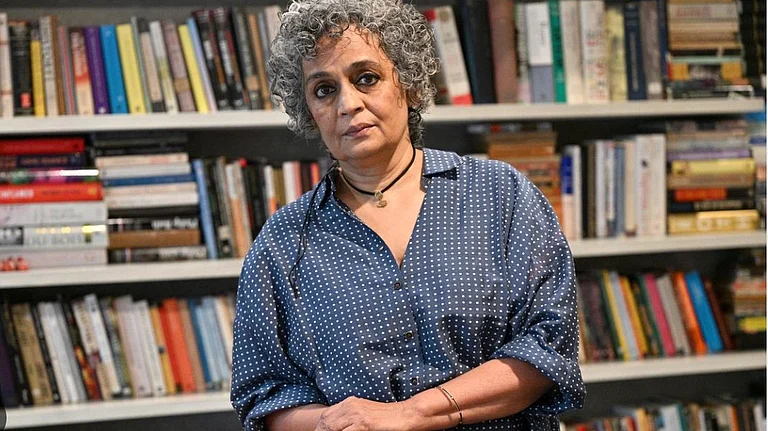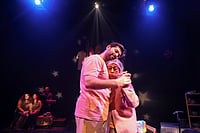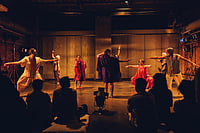Even as the terrifying cyclone, Biparjoy, tore along the west coast of India, wreaking untold misery, another dreadful climatic crisis played out at Mumbai’s Prithvi Theatre. Siachen, written by Aditya Rawal and directed by the maverick Makarand Deshpande, captured the agony of being posted on the highest and coldest battlefield on earth, with a blizzard passing through it.
Translated into Hindi by Raghav Dutt, the play opens with four soldiers on stage, with a stark, steep, ice-covered mountain looming in the background. One of the soldiers is in the sick bay, with an oxygen mask held to his face, gasping for breath. He is, in fact, the doctor who has to cater to the army unit’s medical emergencies. A near impossible task at an altitude of 20,500 feet where the soldiers are battling not an enemy, but something far worse ― catastrophic stormy conditions and biting cold in which even something as basic as passing stool is a herculean task.
In the second scene, there are three soldiers on stage and a body bag in which lies the dead doctor. The commanding officer, Lieutenant Tanmay Bose, fleshed out sensitively by actor Zahan Kapoor, sits in front of the body bag, totally distraught, while Lance Naik Anthony D’Souza ―Bose’s complete opposite― played very convincingly by Chitransh Pawar, goes out to relieve himself. D’Souza returns groaning, with a frozen bum. The effort to pass stool in the freezing weather has made him pass blood.

As weather conditions worsen and there is no sign of a rescue team from base camp to airlift them to a warmer place, Bose and D’Souza begin to lose their nerve. “It would be more honourable to go into enemy territory and be shot rather than freeze into an ice-cream,” proclaims Bose, cracking up. D’Souza frets and fumes, regretting having joined the army just to impress his girlfriend with his uniform. Now, with no noble motive to uplift their morale, Bose and D’Souza end up trading insults and fighting with each other ― army protocol be damned!
It is left to the third soldier, Subedar Shabbir Naqvi, a rounded personality aptly depicted by Niketan Sharma, to separate the two and remind them of their duty to their country. Naqvi urges Bose to have faith in the army. “They will come to save us. We are destined to be rescued,” he says, optimistically. But Bose, who has been forced to join the army by his Brigadier father, and who would rather have been a doctor, is unimpressed with Naqvi’s pep talk.
“2003 se ceasefire hai. Bees saal se humne ek dooosre pe goli nahi chalayi hai, phir bhi hum intezar kar rahen hai, kabhi yeh thand aur toofan humara jaan le le. Aisa pagalpan karo toh taqdeer bhi kamzor padh jaye,” he points out, completely demoralised. Debunking the glory of martyrdom, Bose tells the truth as it is, “Yeh maut ki dehleez hai; desh ki dehleez nahi.”
The reluctant soldier that he is, Bose’s track record shows that he is unable to shoot at the enemy, even to protect himself. But he is no coward. When D’Souza taunts him for being trigger-unhappy, Bose recounts how he had once shot a militant, 25 meters away. “Uska sar tarbooz ki tarah phat gaya. Woh dekh ke mujhe kuchch nahi hua. Lekin meri nazar gayi uski ek chappal pe. Uska sole nikal gaya tha aur ek pink hair-band se bandha hua tha. Woh hair-band ko dekh ke mujhe samajh mein aaya ki maine sirf ek aadmi ki jaan nahi li. Woh ek baap tha, ek beta tha, ek dost tha.”
Naqvi corrects him, “Woh ek terrorist tha. Aapne bas ek terrorist ko mara.”

Through Bose and Naqvi, writer Rawal juxtaposes compassion and the compulsion to do one’s duty. Rawal reveals that he started out by writing an anti-war play. But as he explored what compels us to send our men to such uninhabitable terrains he felt the truth was much more complex. “While both India and Pakistan recognise that maintaining posts on the glacier is not a great idea, they continue to do so because of the prevailing atmosphere of mistrust. Mistrust is a primordial emotion that even the caveman harboured so it is not an easy thing to give up,” says Rawal.
Rawal’s balancing act notwithstanding, at the end of the show, what stays with the audience is the futility of exposing our youth to dire climatic conditions when there is a ceasefire in place. According to some reports, far more lives have been lost here since 2003 due to treacherous weather conditions than enemy bullets.
Siachen’s plot is simple, but movingly etched. Music, sound, lights, set and costume design bring alive the writing, immersing you in a setting far removed from our daily lives. The bleak mood is established immediately with Shaira Kapoor’s minimalist set design. Shaira, who does her grandparents Jennifer and Shashi Kapoor proud, shares the process of designing the set. “Makarand Sir, Aditya and my brother Zahan gave me the guidelines and, accordingly, I used a monochromatic colour palette. Lighting, a key element in making it work, was the genius of Shantanu Salvi and Krish Makhija.”
Ajay Jayanthi’s music, using sound design elements like the howling noise of winds, heightens the terror and tragedy of being cut off from the rest of the country, so hopelessly. “We used a lot of violin and string textures to add to the eeriness of Bana Top ― the highest peak in the Siachen glacier,” shares Jayanthi. “Vaibhav Jadhav, who was operating sound, did a great job of making it all translate live on stage.”
Jadhav orchestrating sound, helped with tips from Mandar Kulkarni, creates profound moments throughout the play. In one scene, he superimposes the rat-tat-tat of guns while Bose recites Veer ka Aaghat — a vulnerable soldier’s dilemma, effectively dramatised.

For costume designer Pallavi Patel, the challenge was in dressing up the cast in snow camouflage parka and jackets in a way that would be suitable for muggy Mumbai’s climate and the hot stage lights. Aditya gave her the images of clothes and accessories he had gathered while researching in Leh and Zahan helped her to source authentic snow boots and jackets. Make-up artiste Ramchandra Ghadi completed the look by giving the actors the weather-beaten, ruddy complexion caused by extreme cold.
Holding it all together and making each department a part of the whole was director Makarand Deshpande, who says he wanted to focus on the pain and the pointlessness of being posted in a terrain that causes, ironically, claustrophobia despite the vast open spaces. “The soldiers are prone to delusions like Naqvi is shown to have in the play. He hears voices of his dead colleagues which become unbearably torturous. So the set, the music, lighting, sound design, everything is geared to heighten the inner trauma of being posted in this harsh, lonely terrain,” says Deshpande.
As we troop out of the auditorium, a soul-stirring, old track of Vande Mataram, from the film Anand Math, plays on the sound system, giving you goose bumps, but also making you wonder if love for the motherland really justifies the premature deaths of young soldiers. Isn’t it time to redefine patriotism?
(The forthcoming shows are in August and September in Mumbai at NCPA Experimental, Nita Mukesh Ambani Cultural Centre, and Prithvi Theater.)


























